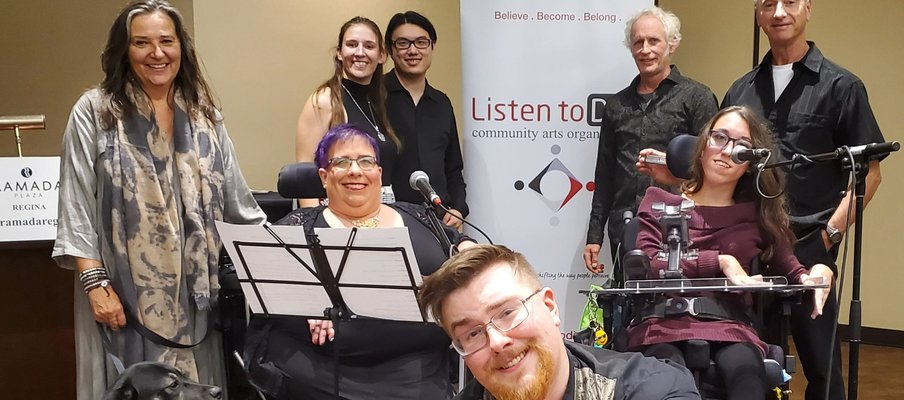Listen to Dis': Increasing Accessibility Is a Journey

Increasing accessibility in an organization is not just a “check-box” list of changes, it’s a learning journey that begins with listening.
While organizations can start with common solutions, such as ensuring wheel chair accessibility and adding closed captioning and ALT Text on websites, or use of American Sign Language (ASL), it does not replace an increased understanding to include accessibility from the perspective of people living with disabilities. Starting in 2020, SaskCulture participated in five sessions led by Listen to Dis’ Community Arts to gain greater insight into the disability culture and the changes needed, including a better understanding, to increase accessibility.
According to Traci Foster, artistic director and founder, Listen to Dis’ Community Arts, “there is a grave misunderstanding of disability within our province,” which includes the arts and culture sector. People often don’t realize what they don’t know about disabilities and accessibility, she says. “People fear what they don’t know.” This is where the Disability Audit process begins.
Foster, along with artist and program partner, John Loeppky, will usually start discussions by dismantling some of the myths spread about those living with disabilities. This includes ensuring participants understand the detriment of “ableism” – which is the discrimination against people with disabilities, and the assumption that some typical abilities are superior.
Other ideas covered in the Disability Audit included discussions on the great diversity of disabilities, from physical to intellectual, and how these disabilities shape identity and culture within the community. “It’s important to know that disability is more than a medical condition,” she explains. And, to understand that barriers are more than just environmental. Attitudinal barriers, such as the idea that disabled artists can only participate in programs designed for disabled people, are often more discouraging.
By listening to people living with disabilities, participants are often surprised by what they learn. As part of the Disability Audit, “we’ve got to go through discomfort,” Foster says, feeling discomfort is a good sign. She says that people really do want to see change, so Listen to Dis’ focuses on “calling people in, instead of calling people out.”
As with all positive change, ittakes time, understanding and a commitmentto change. When people realize that, “everyone will all experience some form of disability in our lives, as we age”, from mobility, to diminishing hearing and sight, it makes even more sense to support initiatives designed to improve accessibility for all.
While there is still lots of work to do in creating understanding, Foster says there has been some shift. The important factor is not to ignore the barriers, or be afraid. Consider work to increase accessibility as part of an inclusion plan. To start:
- Help to eliminate the myths about disability;
- Ensure disability initiatives are led by those living with a disability;
- Consider technological options, such as Zoom events, to increase accessibility for those facing physical barriers;
- Ensure programs create a sense of belonging for those living with disabilities; and
- Resist the check-box narrative – consider all your programs and services from a disability perspective.
Most importantly, listen more, talk less and participate in a learning journey that will bring about positive change that increases accessibility overall.




